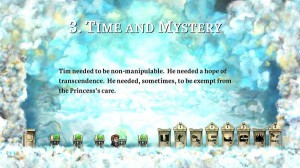“I think that a lot of people feel like the point of life is to be happy, or comfortable, or something like that, whereas I am highly suspicious of those things. All other things being equal I like being happy, but the problem is, all other things are not equal — probably happiness comes at a cost, possibly a great cost. I think this idea is very important in the background of the fiction, most solidly around worlds 5 and 6.”
 The above quote belongs Jonathan Blow, the sole developer of the indie video game masterpiece Braid, and you’d better believe that his above feelings on happiness and emotion come pouring out in the game, one that is (forgive the cliche, but it’s true) very much unlike any other game ever made.
The above quote belongs Jonathan Blow, the sole developer of the indie video game masterpiece Braid, and you’d better believe that his above feelings on happiness and emotion come pouring out in the game, one that is (forgive the cliche, but it’s true) very much unlike any other game ever made.
In the years that have followed since the launch of Xbox Live Arcade and the PlayStation Network (and the ever-extending services to download games on PCs), more and more low-budget titles have been released by indie developers who are finally able to get their (usually) brilliant ideas out to a market without having to worry about upper-executive interference. 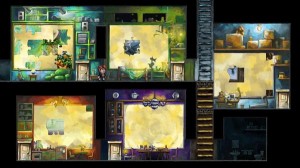 Last Tuesday, Braid was released on the PlayStation Network (following Xbox Live and PC/Mac by a year) and its amazing blend of Mario-style level design, spectacularly intelligent puzzles, outstanding artistic design, and a story packed full of potential metaphors and interpretations (none of them happy).
Last Tuesday, Braid was released on the PlayStation Network (following Xbox Live and PC/Mac by a year) and its amazing blend of Mario-style level design, spectacularly intelligent puzzles, outstanding artistic design, and a story packed full of potential metaphors and interpretations (none of them happy).
Made by one-man-army Jonathan Blow and $200,000 of his own money, Braid is built around a time travel concept where players run, jump, climb, flip switches, find keys, and “rewind” to solve immersive puzzles that get more and more difficult, but never unfairly frustrating.
The story focuses on Tim, a man looking for a princess who has been snatched away. The story is deliberately vague, implying situations rather than spelling out what has happened. As the game puts it, the princess “has been snatched by a horrible and evil monster.” Tim wanders through six surreal dream worlds, full of odd creatures, all featuring by a score consisting mainly of violins and grand pianos. Listen to some of the soothing background music below.
Questions about love, commitment, family, and morality are raised through scriptures that can be read before each level. The game is not a happy one, and the ending is left deliberately ambiguous – there is evidence to argue that the game is a sad tale of a relationship gone wrong, but there is also evidence that the game is about the development of the atomic bomb (Kenneth Bainbridge quote included).
It’s difficult to even begin to describe why everyone, gamer or not, should experience Braid. Of course it has
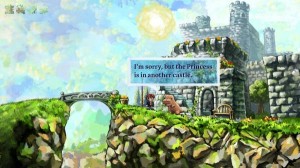
everything it needs to make it, at most, an enjoyable six hours. The level design is terrific, the puzzles are varied enough that it never gets boring, and the core gameplay mechanic – rewinding time – is utilized expertly (time is rewound very differently in every world). If I had to say the one thing Braid has that makes it an incredible experience, it’s the ability to achieve perfect immersion. The game flows, never breaks away, and never does anything to take you out of the experience. There is no title screen – the title shines above Tim as he stands silhouetted by a street lamp when the game turns on. The music – not original, put handpicked from various artists – reverses along with everything else, making it seem as if it is a part of the world as well. Cut-scenes are non-existent, and the game is paced perfectly between running, jumping, climbing, and puzzle solving.
“I don’t want to get on the “modern game industry sucks” rant wagon, but that’s really a big part of the issue. When you’re gunning for the big bucks, you pursue craft, not art. So most of what gamers see is just craft… If you think a game is ‘Madden 2008,’ then hey, games probably aren’t art.”
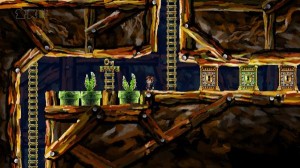 One of the most interesting things about Braid is its creator, and hearing him speak should give great insight into exactly how much emotion he poured into Braid when making it. Inspired to make the game by a vacation in Thailand, Blow claims the game is influenced works such as Italo Calvino’s surrealist novel Invisible Cities, Alan Lightman’s Einstein’s Dreams, and Robert Heinlein’s The Cat Who Walks Through Walls. “From the very first day, Braid was conceived as a videogame with its story presented in the tradition of a few books that I respect, and maybe a film or two,” Blow said.
One of the most interesting things about Braid is its creator, and hearing him speak should give great insight into exactly how much emotion he poured into Braid when making it. Inspired to make the game by a vacation in Thailand, Blow claims the game is influenced works such as Italo Calvino’s surrealist novel Invisible Cities, Alan Lightman’s Einstein’s Dreams, and Robert Heinlein’s The Cat Who Walks Through Walls. “From the very first day, Braid was conceived as a videogame with its story presented in the tradition of a few books that I respect, and maybe a film or two,” Blow said.
And what do others have to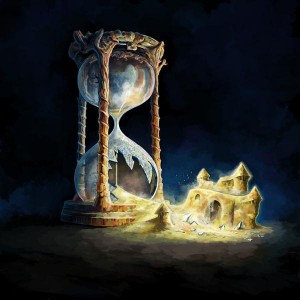 say about it?
say about it?
Kotaku, the largest-read video game blog on the net, said that Braid‘s “temporal puzzle mechanics and mature, powerful storytelling help it pioneer its own path” with the only criticism being “Braid ends.” Beyond the video game critics, NPR’s All Things Considered wrote a long article about it when it was initially released last year, saying, “Braid feels like a game that a grown-up can play, and that a grown-up perhaps ought to play.” Sundance Film Festival Guerilla Gamemaking Competition director Sam Roberts said “It doesn’t feel immature the way other games feel immature, because it doesn’t short you in any respect. It expects as much from you as an audience member as any other fully adult media.”
“It’s a meaning-of-life kind of game. Everything about our daily lives that we consider meaningful is predicated on the difference between past and future.”
If we remember one thing about video game consoles this generation, it should be that every one of them 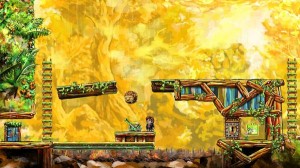 has embraced digital downloads and used the network as a risk-free tool to distribute cheaply produced games with risky concepts and styles that may only appeal to a niche market.
has embraced digital downloads and used the network as a risk-free tool to distribute cheaply produced games with risky concepts and styles that may only appeal to a niche market.
Braid has been out for quite some time on Xbox Arcade and PC/Mac computers at a $15 price tag (well worth it). It was released last week on the Playstation Network for the same price, making Braid available essentially everywhere and giving everybody no excuses to not at least attempt the demo version. I have played it through, and feel comfortable saying it is the most accomplished storytelling in videogames in the past decade – and storytelling that should be examined by fanatics of literature and film as well.

